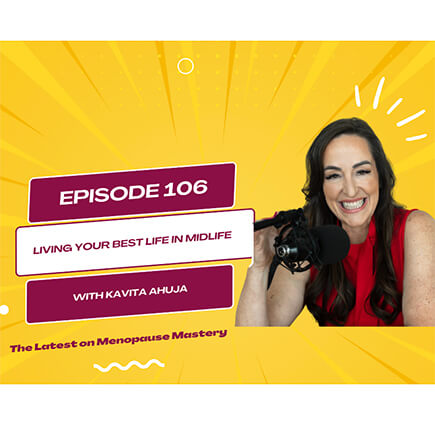 Midlife can be a time of profound transformation and self-discovery, particularly for women navigating the changes associated with perimenopause and menopause. In this episode of the Menopause Mastery Podcast, hosts Dr. Betty Murray and Kavita Ahuja explore key themes such as emotional well-being, community support, the concept of “ikigai,” and practical steps to enrich life during midlife.
Midlife can be a time of profound transformation and self-discovery, particularly for women navigating the changes associated with perimenopause and menopause. In this episode of the Menopause Mastery Podcast, hosts Dr. Betty Murray and Kavita Ahuja explore key themes such as emotional well-being, community support, the concept of “ikigai,” and practical steps to enrich life during midlife.
Let’s look at some of the profound insights shared in this engaging episode.
The Emotional Landscape of Midlife
Emotions and the Law of Attraction
According to Dr. Murray, acknowledging and harnessing our emotions is vital during midlife. The law of attraction suggests that positivity attracts positivity, while negativity attracts negativity. Practices like gratitude journaling, meditation, and surrounding oneself with a positive environment can significantly impact one’s emotional state and attract positive energy.
Living Your “Why”
Living according to your “why”—your core values and purpose—can enhance positive energy and open new opportunities. Reflecting on what drives you, whether it’s family, career, or a newfound hobby, provides clarity and direction during this transitional phase.
Navigating Social Changes and Building Community

Shift in Social Circles
During midlife, changes in social circles are common. Kavita discusses the challenge of losing touch with old friends and the importance of finding new, supportive peers. Whether it’s due to child-rearing, career changes, or personal growth, nurturing new relationships can provide essential emotional support.
Building Supportive Networks
Existing social circles may not always provide the needed support. Dr. Murray and Kavita emphasize the importance of joining communities that foster personal growth, be it support groups, interest classes, or online forums. A supportive network can make navigating midlife transitions significantly easier.
Embracing “Ikigai”
Discovering Your “Ikigai”
“Ikigai,” a Japanese concept, embodies the balance between what you love, what you are good at, what the world needs, and what you can be paid for. Utilizing this framework, as introduced by Dr. Murray, can guide you toward a fulfilling purpose during midlife.
Passion and Reinvention
Kavita highlights midlife as an ideal time to explore new passions or revisit old ones. Integrating these interests into your life can lead to a fulfilling existence without the need to abandon your current career. For example, a lawyer finding balance through gardening demonstrates that personal passions can coexist with professional roles.
The Six-Step Pyramid of Reinvention
- Rediscovering Yourself: Understand your strengths, passions, and values to grasp your “ikigai.”
- Visioning: Identify your desired future self and set clear goals.
- Overcoming Obstacles: Address inner critics and limiting beliefs to overcome barriers.
- Building Confidence: Develop confidence by celebrating small victories and overcoming fears.
- Taking Action: Move from planning to executing your plans.
- Accountability: Maintain progress with the help of mentors, coaches, or supportive communities.
Health, Energy, and Self-Care
- Understanding Vibrational Energy
Dr. Murray explains Bruce Schneider’s framework of energy levels, distinguishing between catabolic (negative) and anabolic (positive) energies. Tools like the Energy Leadership Index can help identify your energy levels and enhance positive states.
- Biological Changes and Creativity
Kavita mentions the shift in neural pathways during perimenopause and menopause from critical thinking to creativity, presenting new opportunities for creative exploration.
- Practical Steps for Self-Discovery
Dr. Murray’s four-step process to discover your “ikigai” involves understanding what you love, what you’re good at, what the world needs, and what you can get paid for. This encourages deep self-discovery and aligns personal strengths, passions, values, and financial potential.
With Dallas Nutritionist Dr. Betty Murray’s expert guidance, you can harness your strengths, passions, and purpose to thrive during midlife transitions.
